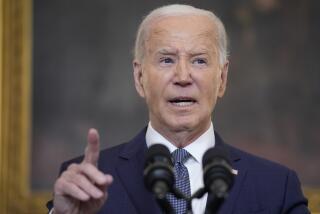Crush Iraqi War Power or No Deal : Gulf: Pressures are mounting to make a deal with Saddam Hussein that leaves the threat to Israel and U.S. interests intact.
The real danger in the Persian Gulf crisis is that there will be a phony settlement because of internal and external pressures on President Bush to avoid war at any cost.
The pressures are ominously reminiscent of the urgings in Britain and France in 1938 that Adolf Hitler be offered a way out of the 1938 Munich crisis. The Anglo-French appeasement of Hitler was a fatal mistake then and a deal with the Iraqi dictator would be equally wrong now.
Any deal will leave untouched the basic threat--the Iraqi war machine, which now includes ballistic missiles with chemical nerve-gas warheads and biological weapons. And Hussein is aggressively seeking nuclear weapons. The only way to remove this threat to the United States and its allies, including Israel, is to destroy Iraq’s war capability.
The sorts of two-stage settlements being floated in Washington by Secretary of State James A. Baker III and others are superficially attractive but unworkable. Stage 1 would be a face-saving Arab deal to pay off Hussein in traditional Middle Eastern style. He would withdraw from Kuwait in return for money, oil wells and territory. Stage 2 would be the creation of a Middle East alliance to contain Hussein, including the United States, Iraq’s neighbors and Egypt.
Hussein would jump at such a deal. Having gambled and lost that he could get away free with annexing all of Kuwait, he needs to strike the next-best available deal.
Like Hitler in 1938, Hussein may graciously agree to be paid off with other countries’ resources and territories. He could afford to let a cowed and compliant Sabah family return to rule Kuwait, just as Syrian President Hafez Assad leaves obsequious puppets in Lebanon’s presidential palace. Hussein’s standing would soar in the Arab world and he would be hailed as the greatest Muslim leader since Saladin. Then he could select his next victim--perhaps Jordan.
To deal with this danger, the State Department proposes a regional security organization based on a long-term U.S. military presence and American-Arab cooperation and burden-sharing. On paper, such an arrangement seems ideal. But to credibly contain Iraq’s untouched and growing power, the organization would have to include Iran and Syria. It is hard to believe that they would join. Even if they did, U.S. public opinion would have a hard time accepting them as allies and Congress would never approve arming them. Assad is, after all, a Junior League version of Hussein.
Second, while a long-term, major U.S. military commitment to the region would be necessary, it would be counterproductive if it involved a large, highly visible American presence. British and Soviet experience in the Middle East shows that the visible presence of what Arabs see as infidels attracts intense nationalist and religious hostility and delegitimizes the host governments. Hussein, like Gamal Abdel Nasser in the early 1950s, could turn such Arab resentment to his advantage, consolidating his role as the hero of pan-Arabism and able to use terrorism to deadly effect against U.S. personnel. The United States and its allies cannot offer Hussein a way out without fatally compromising their security in the gulf region.
Fortunately, a U.S.-led multinational military offensive could succeed where a regional security alliance would fail. A military alliance would have a clear, common objective: the swift destruction of Saddam’s war machine. And overall U.S. leadership, based on its massive military contribution, could coordinate the diverse British, French and Arab units into an overwhelming force.
The unpalatable truth is that the only effective solution to the threat is the physical destruction of Hussein’s military power. Anything less would mean, as Winston Churchill warned in 1938, that unchecked aggression will be “the first foretaste of a bitter cup which will be proffered to us year by year.”
More to Read
Sign up for Essential California
The most important California stories and recommendations in your inbox every morning.
You may occasionally receive promotional content from the Los Angeles Times.









